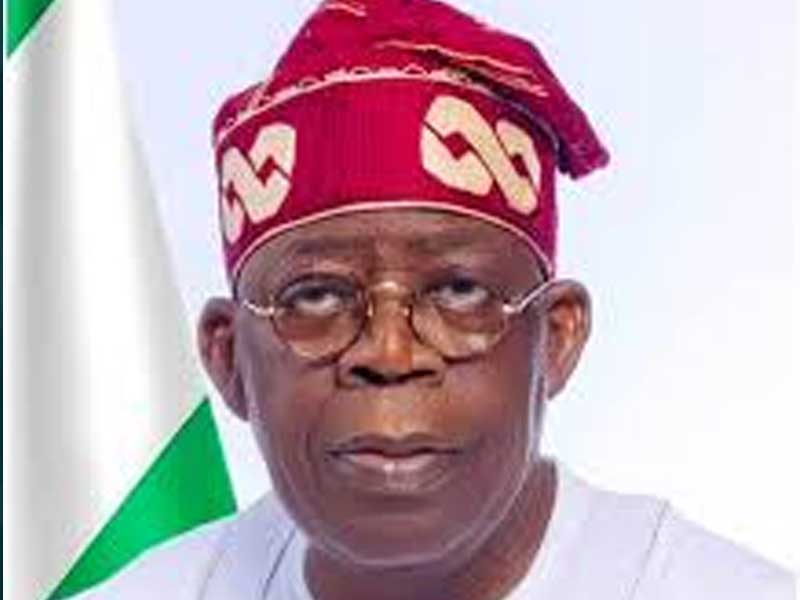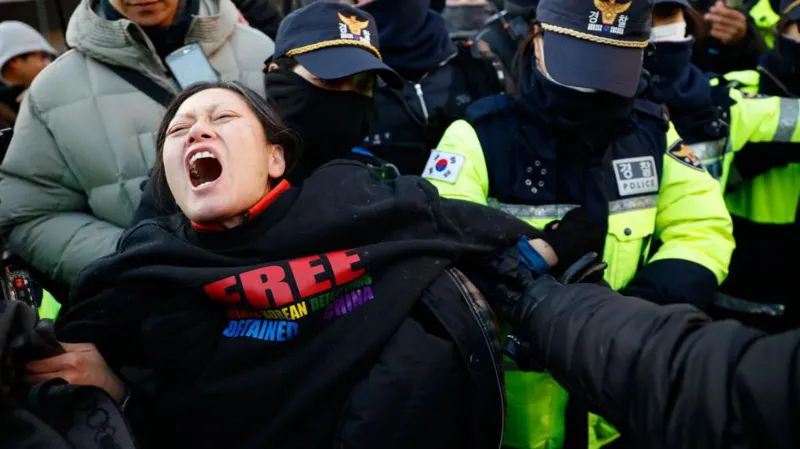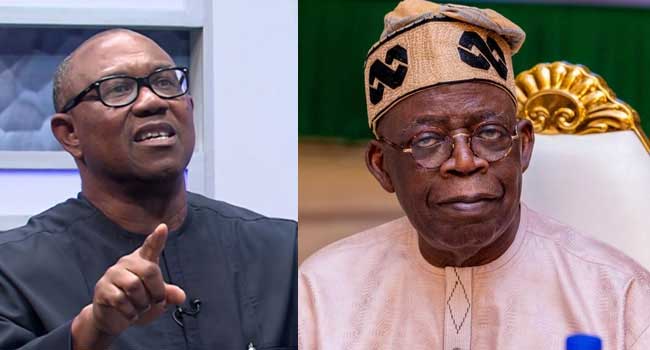Mixed Reactions Trail Tinubu’s Maiden Presidential Media Chat

Chucks Okocha, Emmanuel Addeh, James Emejo, Alex Enumah, Adedayo Akinwale in Abuja, and Dike Onwuamaeze in Lagos Reporting
President Bola Tinubu’s maiden presidential chat has continued to elicit divergent views and comments from a cross-section of Nigerians.
While many reckoned that his views on key national issues actually hit the bull’s eye, several others posited that some of his remarks were largely off the mark.
The respondents ranged from politicians, senior lawyers, business analysts, the clergy, and economists, among others.
Tinubu had Monday held his first presidential media chat, 18 months after assuming office, in a move that took the nation by surprise, especially since he deliberately avoided debates ahead of the 2023 national elections.
The president engaged with senior journalists, addressing a broad range of topics primarily focused on his economic reforms and security measures.
In his responses, he was largely candid, though some remarks sparked considerable debate. Key issues included his firm stance against reducing the size of government, the wholesale removal of the petrol subsidy, and the decision to float the naira against more stable currencies like the US dollar.
Reacting to the president’s media engagement, Mr. Ahmed Raji, SAN, commended his bold initiatives, emphasizing that tough decisions—such as the removal of fuel subsidies and tax reforms—are essential for Nigeria’s progress.
“I fully support the president’s stance on tax reforms and subsidy removal. Our current tax laws have significant gaps that urgently require harmonization,” he remarked.
Raji further highlighted that the four bills pending in the National Assembly had effectively addressed many of the nation’s pressing economic challenges. He also noted that the principle of attribution was adequately incorporated into the country’s Value Added Tax (VAT) framework, ensuring more effective operations.
“A proper understanding of the principle of attribution is very crucial to the appreciation and understanding of the principle of derivation,” he added.
On the stampede occasioned by the distribution of palliatives by some Nigerians, the senior lawyer blamed it on ignorance and lack of self worth, stating that the organisers had a lot of the blame to take.
Speaking on the administration’s battle against insecurity, Raji argued that any change in the leadership of the security agencies could have a negative impact.
“With the current onslaught in the North-west against the Lakurawas, the military needs encouragement and not rejigging. We should not dampen their spirits and morale,” he argued.
Another senior lawyer, Rev. John Baiyeshea, SAN, however, expressed disappointment with Tinubu’s response to issues that were discussed, saying the president was dismissive in all his answers, a development he added showed lack of empathy and concern for the people whose votes put him in power.
According to Baiyeshea, the president spoke from the point of one, who saw himself as being so much aloof from the painful realities of his ‘chronic’ economic policies currently impacting negatively on the people.
Claiming that Tinubu did not demonstrate leadership with a human face all through, Baiyeshea stated that the president spoke so casually to all the issues with the gusto of a leader, who feels that his position was so sure and secured and entrenched to the extent that nothing could be done to him.
“The president was addressing Nigerians who are already on ground zero of life and you as president cannot speak good, soothing, and encouraging words to help your traumatized citizens from the siege mentality that your harsh economic policies have put them in.
“I once believed that this president, given his background as a NADECO activist and his tenure as governor of Lagos State, was a compassionate leader—a welfarist committed to utilizing the nation’s resources for the collective benefit of its citizens.
“However, I am now questioning what drives people in authority to act contrary to the welfare of those they govern. The removal of the fuel subsidy is a deeply controversial and troubling policy that has brought poverty, misery, illness, hunger, anger, and frustration to Nigerians.
“Instead of appealing to citizens for understanding with humility and empathy, the president coldly declared that there would be no reversal of the policy. It felt as though he was telling Nigerians to fend for themselves, displaying an alarming level of disregard and disrespect for the people.
“Even more disheartening, he offered no hope or indication of when these hardships might end. Nigerians are left bearing the brunt of systemic corruption,” he argued.
The Peoples Democratic Party (PDP) also weighed in, condemning the president’s remarks as evidence of the All Progressives Congress (APC) administration’s lack of empathy for the widespread suffering caused by its poorly executed and anti-people policies.
In a statement by its National Publicity Secretary, Debo Ologunagba, the PDP stated, “President Bola Tinubu’s assertion that he has no regrets over the abrupt removal of the fuel subsidy—without implementing cushioning measures to alleviate the devastating impact on the productive sector, cost of living, and overall hardship—further underscores the APC’s detachment from the fundamental responsibility of governance, which is the welfare and security of the citizens.
“This callous approach has pushed Nigerians into deeper poverty and untimely deaths, revealing the APC’s indifference to the struggles of the people,” the statement concluded.
The PDP spokesman said it was instructive that Tinubu in the chat admitted that Nigerians were bearing the brunt of the failure and inability of the APC administration under his watch to effectively police and secure the nation’s borders so as to prevent the smuggling of petroleum products to neighboring countries.
Ologunagba said the PDP was disturbed that while the APC had failed to account for the proceeds saved from the removal of subsidy, Nigerians were subjected to crushing economic hardship because the APC administration had failed in its fundamental duty of ensuring the territorial integrity of the nation.
Furthermore, he said Nigerians were appalled that instead of admitting failure and seeking solutions, Tinubu claimed that the nation’s economy had improved under his watch when in reality the situation had worsened with a comatose productive sector, deteriorating value of the Naira at N1,700 to the US dollar, 34.6 percent inflation and 40 percent unemployment rates in the last 18 months.
Ologunagba said the widespread food stampede in various parts of the country which recently led to the death of many Nigerians showed that Nigeria was indeed in perilous times under the APC.
The Northern Elders Forum (NEF) said it believed that the media chat was informative and engaging.
Spokesperson of the forum, Abdul-Azeez Suleiman said while the president touched on a number of issues, he would have loved to hear more specifics on how he planned to address the root causes of insecurity, such as poverty, and unemployment, among others.
President Tinubu’s Media Chat: Reactions and Key Takeaways
President Bola Tinubu’s maiden media chat has sparked widespread discussions among Nigerians, with many eager to hear his perspectives on critical issues such as security, the economy, and his proposed reforms. As a concerned citizen, I was particularly interested in understanding his strategies for addressing these pressing matters.
During the chat, President Tinubu discussed a range of topics, including his vision for economic growth, plans to tackle Nigeria’s security challenges, and proposed reforms aimed at improving governance and accountability. While his speech was articulate and well-reasoned, it left some yearning for more specific details and actionable steps.
On security, the president underscored the importance of a comprehensive approach that integrates military actions with social and economic interventions. Although this is a promising direction, many, including myself, hoped for more clarity on addressing the root causes of insecurity, such as poverty, unemployment, and inequality.
Regarding the economy, Tinubu outlined a vision to diversify the country’s economic base and support small and medium-sized enterprises (SMEs). While these goals are commendable, the lack of detailed policies and concrete initiatives left room for skepticism about their implementation.
In discussing governance, the president highlighted the need for greater transparency and accountability, alongside strengthening institutions. These principles are undoubtedly crucial, but specifics on how he plans to overcome systemic challenges and implement these reforms were notably absent.
In summary, while the media chat was engaging and informative, it fell short in offering the actionable clarity many Nigerians had hoped for. As a citizen, I remain optimistic that the president will continue engaging with the public and providing more robust insights into his plans.
Expert Reactions
Legislative Consultant and Analyst, Mr. Akinloye Oyebanji
Mr. Oyebanji expressed disappointment that the president’s first media chat came 18 months into the administration, arguing that a series of engagements should have been held earlier to address Nigerians’ concerns and gather feedback.
“Presidential chats at this stage are not encouraging, especially for an administration that has taken drastic decisions impacting all levels of the economy. Such engagements should serve as platforms to discuss policies, address concerns, and consider citizen input,” he remarked.
He highlighted key concerns, including high living costs, tax reforms, fuel subsidy removal, currency devaluation, and excessive government spending. While some were addressed, Oyebanji noted the president’s unwavering resolve to continue with controversial policies, despite widespread criticism.
Abuja-Based Cleric, Bayo Oladeji
Cleric Bayo Oladeji welcomed the media chat, calling it long overdue, and prayed it would become a regular occurrence. He noted that it offered Nigerians insight into the president’s thinking and approach to governance.
“Every president has a unique style, and Nigerians must either agree or disagree with it. President Tinubu justified his policies and rated his performance highly. It’s now up to economists and security experts to evaluate his claims,” Oladeji stated.
He acknowledged the hardship caused by policies such as subsidy removal and naira devaluation but argued that Nigerians must adapt, as the president believes these measures are necessary to revive the economy. He advised the president to establish a clear timeline for his policies to foster public trust.
Prof. Uche Uwaleke, Capital Market Expert
Professor Uwaleke rated the president’s performance above average, praising his focus on security, agriculture, and anti-corruption efforts. He cited initiatives like subsidy removal, the minimum wage increase, and the student loan scheme as significant achievements. However, he expressed disappointment over Tinubu’s refusal to reduce his cabinet size.
Mr. Idakolo Gbolade, Managing Director, SD&D Capital Management
Mr. Gbolade commended the president’s emphasis on revenue generation, security, and debt management as part of his transformation agenda. However, he criticized the administration’s failure to adequately address pervasive poverty and the severe hardship faced by many Nigerians, noting that Tinubu’s appeal for patience offered little consolation.
“The economic situation is biting very hard on the people and it could be evident in the desperation of Nigerians when palliative items were being distributed leading to stampedes.
“The major concern of the people is their welfare which can be taken care of with more employment opportunities, reduced cost of living, and a pragmatic solution to the very high cost of goods and services.”
The Director General of the Nigerian Employers’ Association (NECA), Dr. Adewale Smatt Oyerinde, and the Chief Executive Officer of BIC Consultancy Services Limited, Dr. Boniface Chizea, commended the Nigerian leader for hosting the press and hoped that the development should continue.
They also believed that Tinubu did not deal sufficiently with issues that bothered Nigerians the most.
For instance, Oyerinde, said the President’s address did a bit to address the issues when more definitive statements would not have been a bad idea, especially as the nation is grappling to cope with the bitter pill of this administration’s ongoing reforms.
He, however, agreed with the president on the issue of price control.
“You can only introduce the mechanism of price control when you have control on the cost, availability, and supply of critical inputs, such as FX, raw materials, etc. If you cannot control the prices of inputs, you cannot control the prices of goods and services on the shelves,” he pointed out.
Oyerinde also said the removal of fuel subsidies, the student loan scheme, and the minimum wage increase could not, on their own, solve the endemic challenge of corruption.
“We want to believe the president’s statement was taken out of context. While the three issues he raised address some fundamental challenges, they are insufficient to tackle the broader issue of corruption,” he noted.
He argued that public borrowing, in itself, is not a bad idea if the funds are properly utilized for developmental purposes. However, he expressed concern that Nigeria’s past borrowings have yielded little to no tangible results, leaving much to be desired.
Chizea also criticized the president for failing to address key concerns, such as the revitalization of government-owned refineries, a pressing issue for many Nigerians.
On the other hand, he aligned with the president’s stance against price control, agreeing that it is an ineffective measure. He also supported the continuation of the ongoing tax reforms.
“I think we should not reverse the tax reforms,” Chizea emphasized, adding that “price control has never worked.” However, he questioned the necessity of Tinubu’s large cabinet, suggesting it was unwarranted.




